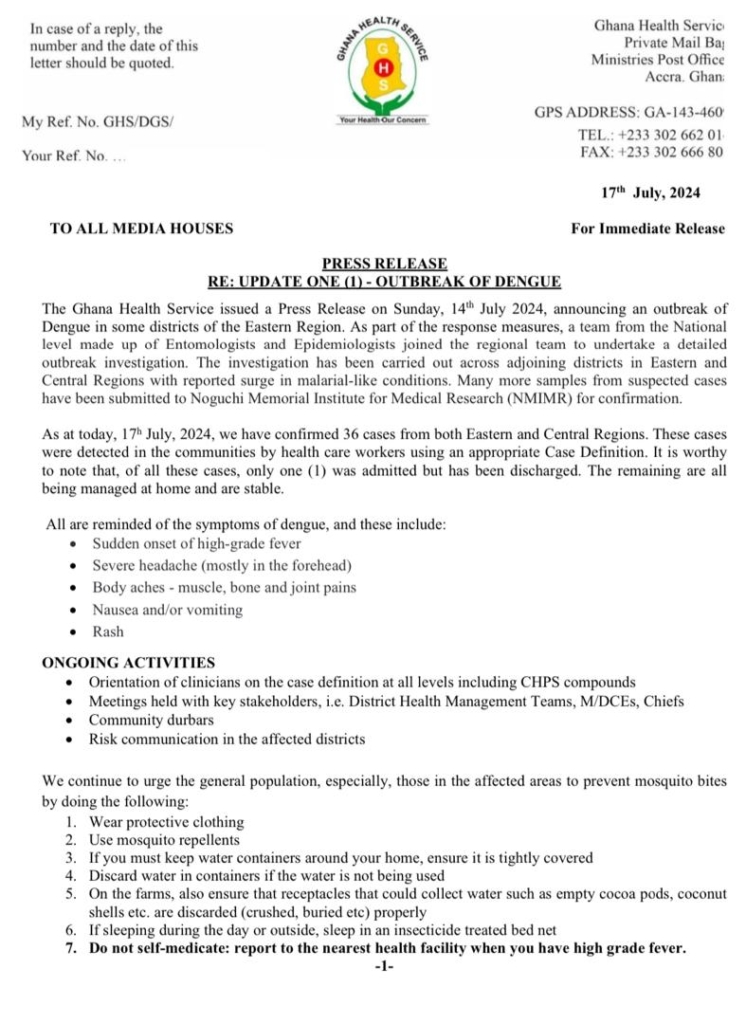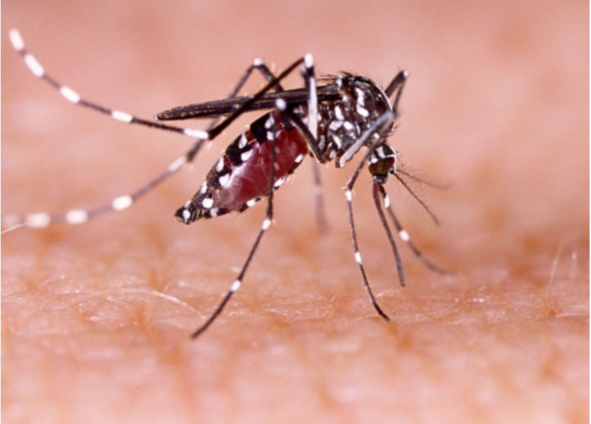The Director of Public Health at the Ghana Health Service (GHS), Dr Franklin Asiedu Bekoe, has emphasised the importance of early detection and treatment in addressing health issues.
In a recent interview, he cautioned the public against self-medicating if they experience fever, as it could be Dengue Fever, and stressed the importance of reporting to a hospital for early treatment.
"The focus is about early detection and that is what we are doing so when you have a fever, don’t assume that it is malaria then you self-medicate. Come to the hospital, we take your blood – we first find out whether it is malaria and examine the cause of the fever,” he said.
This warning follows the Ghana Health Service's statement on July 17, confirming 36 cases of Dengue Fever in the Central and Eastern regions over the past 72 hours.
The statement noted that the cases were identified using an appropriate case definition, with one patient being admitted and subsequently discharged.

Dr Bekoe assured that the recorded cases are recovering well, as most are non-severe Dengue cases.
Dr Bekoe also detailed the Ghana Health Service's latest plans to slow the spread of Dengue Fever, which includes extensive community campaigns through information centers, radio stations, and public announcements to caution people about the Aedes mosquito, which spreads the virus.
Read also: Dengue Fever: Health experts sensitise affected region
Dengue Fever, a severe flu-like illness caused by a virus spread by Aedes mosquitoes, has the potential to spread to other areas if not properly managed.
Overview of Dengue Fever: According to the World Health Organization (WHO), dengue is a viral infection transmitted to humans through the bite of infected mosquitoes.
Approximately half of the world's population is at risk, with an estimated 100–400 million infections occurring annually. Many dengue infections are asymptomatic or cause mild illness, but the virus can occasionally lead to severe cases and even death.
Danger and Prevention: Dengue is particularly dangerous because its prevention and control depend on vector control. There is no specific treatment for dengue or severe dengue. Early detection and proper medical care significantly reduce the fatality rates of severe dengue. Most people infected with dengue will not show symptoms, but common symptoms include high fever, headache, body aches, nausea, and rash.
Recovery typically occurs within 1–2 weeks, but severe cases may require hospitalization and can be fatal. The risk of dengue can be lowered by avoiding mosquito bites, especially during the day.
Symptoms of dengue fever include:
- High fever
- Severe headache
- Pain behind the eyes
- Muscle and joint pains
- Nausea
- Vomiting
- Swollen glands
- Rash
Latest Stories
-
Shirley Frimpong Manso addresses poor support system in film industry
14 minutes -
Genesis Foundation launches campaign to tackle Teenage Drug Abuse on June 21
26 minutes -
GII urges Mahama to match words with action on anti-corruption commitments
46 minutes -
“I Needed to Speak”: Funke Akindele gets candid about loss and mental health
52 minutes -
JoyPrime’s TroTro Diaries partners with COMAC to champion fuel quality and road safety
58 minutes -
Clara Kukua Savage
1 hour -
GAFOSC in commanding form ahead of decisive UG Corporate League clash
2 hours -
99% of NPP Council members backed early presidential primary – Justin Kodua
2 hours -
Ablekuma North collation: Police playing funny games with us – NPP
2 hours -
Education Ministry orders nationwide audit over poor quality of SHS meals
2 hours -
Visa delays due to logistical failures by US Postal Service – Ablakwa
2 hours -
Two suspected robbers lynched, two arrested in Bosome Freho after fatal attack
2 hours -
Pan-Africanists strengthen case for reparations from colonial masters
2 hours -
Gov’t suspends NSA’s portal for posting personnel over ghost names scandal
2 hours -
Michael Blackson and fiancée Rada Darling welcome son ‘Lil Mikey’
2 hours

